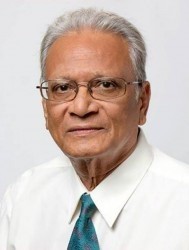Recognising that the education sector is in a crisis, the Ministry of Education will focus next year on improving teacher training, increasing instructional time for students, improving monitoring and evaluation and better monitoring supervision of capital projects, Education Minister Dr Rupert Roopnaraine said yesterday.
Underscoring the government’s commitment to the sector, Roopnaraine yesterday pointed out that some 17% of the proposed 2017 $250B budget has been earmarked for the sector. This, he said, during his contribution to the budget debate in the National Assembly, is the government’s “hard-nosed recognition that there are things that are institutionally wrong with the system and that we cannot skimp on investment on education.”

He said next year would see the commencement of the construction of a new school of medicine on the University of Guyana campus, which will be a facility for clinical services attached to the Georgetown Public Hospital Corpora-tion. This will be done under the Yesu Persaud endowment. Finalisation of the construction of a new 300-seat lecture theatre as well as a new student services building will also occur, he added.
Describing the task as “arduous,” Roopnaraine said the administration is moving towards building a solid education infrastructure as a central pillar of the country’s survival in the new century.
The Minister announced that the Commission of Inquiry into the sector is expected to wrap up its investigations by this month end and its findings would be made public in the first quarter of next year.
Under the area of pedagogy, the Minister pointed out that $337.4M has been allocated for the Pro-gramme for Emergency Education Reform (PEER) initiative, which follows from several measures initiated by the ministry since 2015.
“Why this is important is that when it comes to education, twenty years from the beginning of the new millennium is exceptionally different than the twenty years prior when it comes to the advances made in the crucial education areas of science and technology,” he said.
It is expected that the PEER initiative will focus heavily on improving maths scores through comprehensive diagnosis of current constraints, methodology review, and the recruitment of a cadre specialists for targeted interventions.
And even as the administration pushes forward with the Science, Technology, Engineering and Maths (STEM) programme, the minister said that it will not lose sight of the important role that arts education has to play in creating a well-rounded, civic-minded student and in laying the educational foundation for the country’s creative leaders.
Next year, he added, the ministry will target the “worrying trend in decreased enrollment” in visual arts with the training of 132 teachers in multiple arts disciplines and across more than half of the education districts. Teachers training in music, drama and dance will also be enhanced as another three schools will be equipped with steel bands, bringing the total to 24 schools.
As for the delivery of service, Roopnaraine said that the ministry would continue to coordinate, monitor and evaluate activities of the 2014 to 2018 Strategic Education Plan, with particular focus on the implementation of regional plans, thereby enhancing the country’s programme to ensure that schools are certifiable as child-friendly spaces.
On the cards for next year is the reestablishment of the long missing National Commission and for it to be used as a framework for policy-derived actions on culture, youth and sport. Next year will also see the strengthening and greater autonomy of the National Accreditation Council and an increased capacity for international accreditation and equivalency under the entity, he added.
Roopnaraine also said the school health, nutrition and HIV/AIDS unit will be transitioned into an official implementing unit within the ministry, equipping it with the tools to continue to expand its scope of work in collaboration with partners like UNICEF.
He added that more efficient ways of listening to people on how they feel the education system is working and how it is not are needed.
“It is only then we can really develop and implement holistic solutions to our many and increasingly complex challenges,” the Minister said.
Meanwhile, innovation that harnesses the tremendous power of information and communication technologies, according to Roopnaraine, remains at the heart of the ministry’s plan for improving the education sector in service of national development.
In 2017, the Manage-ment Information Systems (MIS) Unit will be tasked with implementing or upgrading IT labs in a total of 80 primary schools and providing internet access or classroom interactivity resources to another 100.
Noting the importance of the sector to the nation’s development, Roopnaraine said that while he understood the key purpose of a political opposition, to oppose education should not be “the target of unnecessary politicking and partisanship for partisanship sake.”
“I do not expect unanimity, nor do I expect an absence of strident critique–I do however expect that whatever criticisms are made will be done from an informed perspective and in good faith,” he said.





